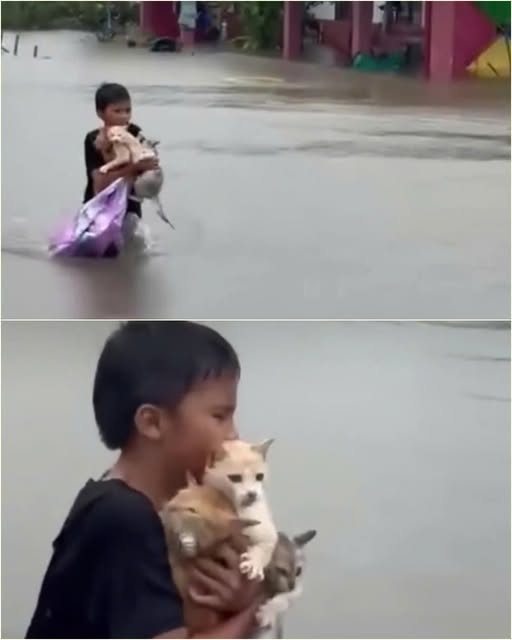The rain had been falling for days in Malaysia — the kind of relentless rain that doesn’t just wet the earth, but swallows it. Rivers overflowed. Roads disappeared. Entire neighborhoods dissolved under muddy water that crept higher with every passing hour. Local families packed what they could into plastic bags and climbed onto roofs, trees, or any scraps of dry land they could still claim.
In the middle of this chaos, where survival was the only instinct left, one small boy made a decision that would stop the world in its tracks.
He couldn’t have been more than ten years old. Barefoot, soaked to the bone, and clutching something close to his chest, he waded through waist-deep floodwater. The current pulled at him with every step, but he didn’t stop. His eyes stayed forward, jaw set, breath controlled — the kind of quiet bravery that doesn’t announce itself, but simply moves.
At first, people watching him from higher ground thought he was carrying a bundle of clothing or maybe books he was trying to save. But then, when he got closer, they saw movement. A tiny paw. A trembling tail.
In his arms, pressed against his small chest, were three kittens.
Three shivering, terrified kittens who had been left behind on a floating piece of debris as the water rose — forgotten, abandoned, or simply too small for most people to notice.
But the boy noticed.
And he refused to leave them.
“Why didn’t you leave them?” someone would later ask.
The boy didn’t hesitate.
“Because they’re the only thing I have left.”
The answer landed on the world like a blow. Not dramatic. Not poetic. Just truth — raw and tender, spoken by a child who had lost more than most adults ever will.
These cats, he explained, weren’t pets he rescued from the streets. They were his cats. His family. When the flood took his home, washed away the bed he used to sleep in, the clothes he used to wear, the schoolbooks he used to read — it also tore away everything familiar. Everything except them.
“They’re my treasure. My family. I couldn’t let them drown.”

In a world that tells children to grow up fast, he chose kindness instead.
Where others might have grabbed bags of rice, money, blankets, or phones — he reached for fur, for life, for love.
He held them like something sacred.
He walked like someone who had decided that fear didn’t get to win.
No dramatic rescue team. No cameras. No adults telling him what to do.
Just a boy.
A flood.
And three small, helpless lives depending on the strength of his arms and the courage in his heart.
Someone took a photo.
The image spread — first through Malaysia, then into bigger news feeds, then across oceans. It wasn’t edited, staged, or polished. It was just a child in brown water holding three kittens above the surface like the world’s smallest ark.
People around the globe stared at their screens and paused.
They didn’t see a victim.
They saw a protector.
And suddenly, thousands began writing the same thing:
“This is what humanity should look like.”
The comments poured in.
-
“That boy understands love better than most adults do.”
-
“Heroes don’t always wear uniforms. Sometimes they wear wet shirts and flip-flops.”
-
“He saved what he had left — and that makes him richer than most.”
Even rescue workers, wildlife groups, animal lovers, and humanitarian organizations shared the same message:
“Courage is not measured by strength, money, or age — but by compassion.”

When love is all you have, you protect it more fiercely.
People eventually learned more about him. He was from a low-income family in a rural area affected hardest by the rising waters. His home was gone. His clothes, soaked. His future uncertain.
What he carried out of that floodwater wasn’t just three animals.
He carried memory.
He carried responsibility.
He carried love that wasn’t crushed by disaster — but strengthened by it.
He didn’t save them because he was bored, curious, or trying to impress anyone.
He saved them because they were what remained of home.
So he held them closer.
The world can learn from a boy who never asked to be a hero — but became one anyway.
Some people say children don’t understand sacrifice.
Some say they’re too young to know what love truly means.
But this boy proved them wrong with every slow, steady step through the flood.
He didn’t have money.
He didn’t have safety.
But he had a heart that chose life over convenience.
In a world where adults debate, destroy, divide — a child risked everything he had… for something small. Something voiceless. Something that couldn’t thank him or repay him.
That’s the kind of love that changes things.
Not the kind that gets applause.
But the kind that doesn’t wait for it.

And when he finally reached the dry patch of ground…
Someone laid blankets down.
Someone brought food.
Someone helped dry the kittens, wrap them, comfort them.
But the boy didn’t leave their side.
He sat with them, hand on their small backs, whispering as if they were made of glass. His voice soft, gentle — not triumphant, not proud. Just relieved.
He didn’t smile for cameras.
He didn’t pose like a savior.
He was just tired.
But his eyes — even in exhaustion — never let go of the words he’d said earlier:
“They’re all I have left.”
Olaf’s Fight — The Little Boy Facing a Giant 210

Extended English Version
Olaf is only two years old.
At this age, he should be chasing butterflies, learning new words, and giggling until he runs out of breath.
Instead, he lies in a hospital bed — his tiny body fighting against a cruel enemy: glioma, a malignant brain tumor.
Melissa Blake: Turning Pain into Power and Beauty

